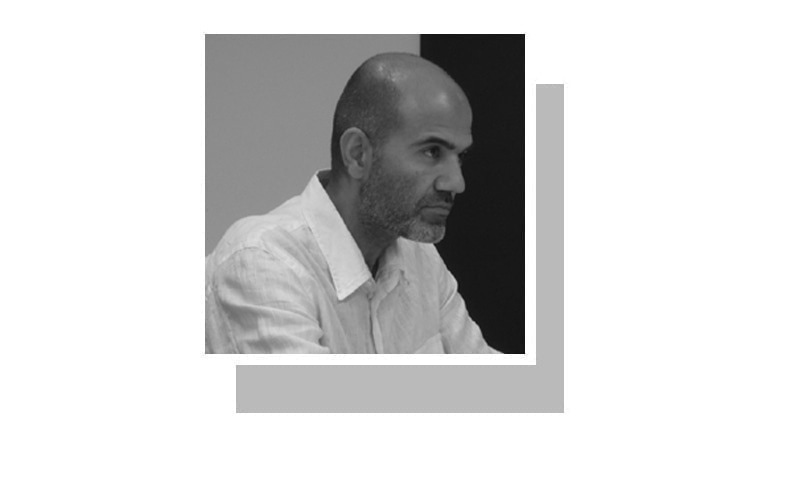“Hell is not something that awaits us, but this life here and now” — Walter Benjamin
WHILE millions still languish under open skies amidst stagnant water in Sindh and parts of eastern Balochistan, the country’s second largest city Lahore is now in the grip of a suffocating, dense smog. For those of us who are willing to say it, dystopia is here.
If the effects of climate change are felt in the Sindhi, Seraiki and Baloch peripheries in the form of wild fluctuations — veering between scorching heat waves and massive deluges of water — then the urban metropolis is like a vacuum cleaner for dust, smoke and a plethora of particulate matter that literally leave even healthy people gasping for air.
And just like this past summer’s floods were not a first — with iterations since at least 2010 — Lahore’s smog is now permanently part and parcel of the winter season. There is no sign that heatwaves, floods, smog and so on will let up anytime soon, notwithstanding the currently fashionable lingo of ‘adaptation’ and ‘mitigation’. What we really need is to name and then transform he elephant in the room — capitalism.
Amidst the stasis, the class divide deepens.
It merits repeating that what we call climate change represents the cumulative effect of hundreds of years of capital accumulation around the globe, replete colonisation, slavery and unbridled industrialism. But this is not a story in the past — it continues to play out today, and we continue to ignore it at our peril.
Take, for example, some of the major underlying triggers of Lahore’s smog. Brick kilns emit massive amounts of smoke — but they are profitable for owners and subcontractors who continue to rely on a form of serfdom which the Supreme Court banned 30 years ago! Meanwhile, the number of emission-producing motor vehicles on the roads of the greater Lahore area grows almost exponentially every year. Manufacturers sell cars for profits to captive consumers, and the government imports billions of dollars of oil and builds roads to facilitate. It could, instead, invest in universal public transport.
Amidst the stasis, the class divide deepens. In theory, smog affects everyone equally. But while well-to-do professional classes and businessmen can work from home and send their kids to schools that can meaningfully conduct online classes, industrial workers, street vendors, rickshaw drivers and domestic servants all have to go out to earn a living on a daily basis. As, of course, do the children, women and men who comprise the bonded labour that make brick kilns tick. Even if they do stay home, they do not have the option to buy air purifiers and breathe a bit easier.
Some might argue that the proverbial ‘poor’ also contribute to the smog through practices like waste and stubble burning. This is factually correct, but blaming the victim does not absolve the perpetrators of the foundational crime, which is the systemic practice of instrumentalising nature and exploiting ‘cheap’ human labour for profit.
The class divide is pronounced in the ethnic peripheries too. Today, more than four months after the floods, there are more than a few residents of districts like Qambar Shahdadkot, Dadu, Naseerabad and Jaffarabad where life has returned to some kind of normal. Seeds are sown and tractors merrily plough the land. In some cases, the impending harvest looks very promising.
Ask around and you will find that almost all of these feel-good stories involve a local landlord who, in cahoots with district administrators, created embankments around his own plot and drained it of water. For millions who do not enjoy generational wealth and power, there is no civil servant offering to drain water or rebuild mud homes. Even medicines to provide relief from malaria are conspicuous by their absence in the district health office.
Extrapolate these stories to the world scale and we are at the whims of agribusiness firms, fishing conglomerates, meat industries, fossil fuel companies and a host of (primarily) Western governments that refuse to contemplate cutting these various profiteers down to size. To reiterate, capitalism is a man-made disaster that is both systemic and systematic. There can be no meaningful redressal of climate change without challenging the foundational logic of capital accumulation.
We need radical, nay, revolutionary steps. To say this is not to suggest that there is any way of fixing endemic problems like Lahore’s smog overnight. Neither is it sufficient to simply announce bans on certain practices — as the 1992 Supreme Court judgement on bonded labour makes clear. What we do need is an alternative imaginary to challenge hegemonic notions like the aspiration for everyone to have a gas-guzzling vehicle and consume like there is no tomorrow. It is in cities like Lahore that capitalist ideology is most entrenched; this is why we need a class politics for ecological transformation.
The writer teaches at Quaid-i-Azam University, Islamabad.
Published in Dawn, December 9th, 2022











































